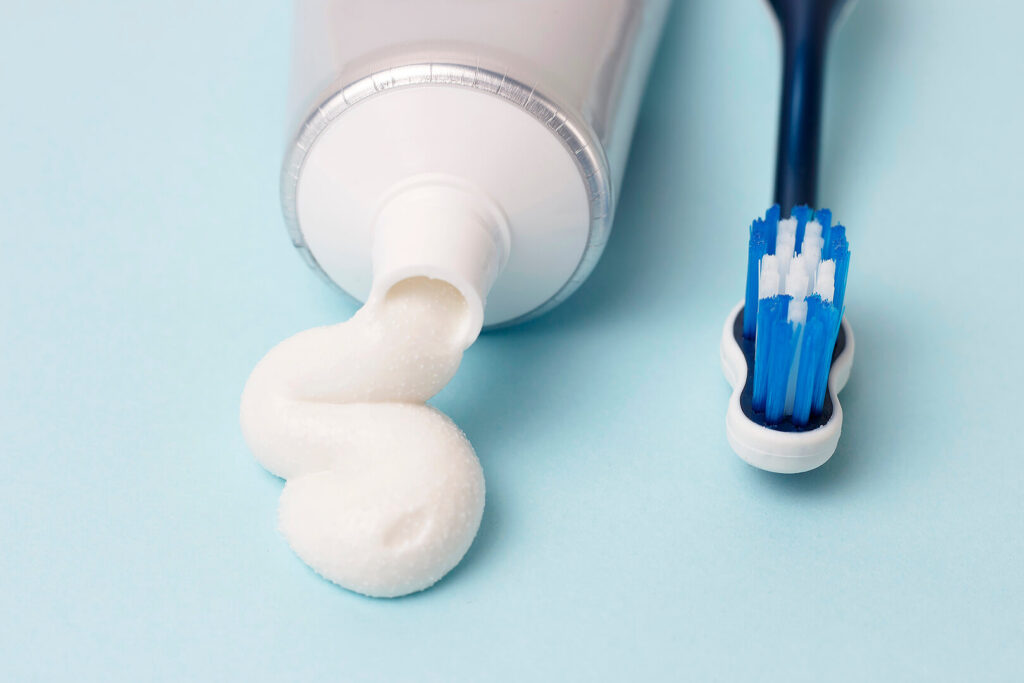Toothpaste Guide
Toothpaste Guide
Toothpaste might seem like a no-brainer in your daily routine, but not all formulas are created equal — and using the wrong one can compromise your oral health. Whether you’re tackling sensitivity, aiming to brighten your teeth, or looking to strengthen enamel, the right toothpaste can make all the difference. With so many options available, this guide will help you decode your choices and select the ideal product for your unique smile needs. And if you’re in Naples, Florida, Family Dentistry Naples is here to help you make informed, professional choices for lifelong oral health.
Toothpastes Decoded: Choosing the Right Formula for Your Smile
Toothpaste may seem like a simple item on your shopping list, but the wrong formula can leave your smile short of its full potential. Whether you’re battling plaque, dealing with sensitivity, or trying to brighten your teeth, choosing the right toothpaste is key to maintaining excellent oral health.


Toothpastes Decoded: Choosing the Right Formula for Your Smile
Toothpaste may seem like a simple item on your shopping list, but the wrong formula can leave your smile short of its full potential. Whether you’re battling plaque, dealing with sensitivity, or trying to brighten your teeth, choosing the right toothpaste is key to maintaining excellent oral health.
Understanding Common Toothpaste Formulas
Toothpaste comes in a variety of formulas, each designed to meet specific needs. Here are a few of the most common types:
- Fluoride Toothpaste: Helps prevent cavities by strengthening enamel.
- Whitening Toothpaste: Contains mild abrasives or chemical agents to remove surface stains.
- Tartar Control Toothpaste: Helps prevent the buildup of tartar above the gumline.
- Sensitivity Toothpaste: Formulated to reduce discomfort from hot, cold, or sweet foods.
- Natural Toothpaste: Avoids synthetic ingredients and often uses herbal components.
When Fluoride is Essential
Fluoride is one of the most effective ingredients in preventing tooth decay. Unless advised otherwise by your dentist, fluoride toothpaste should be your default choice. It strengthens enamel, reverses early decay, and is especially beneficial for children and seniors who may be more susceptible to cavities.
Whitening Toothpaste: Pros & Cons
Whitening toothpaste can be effective at removing surface stains caused by food and drinks. However, some contain abrasives that, with frequent use, may wear down enamel over time. It’s best to use whitening toothpaste in moderation or as recommended by your dentist.
Charcoal Toothpaste: Hype or Harm?
Activated charcoal toothpaste has gained popularity for its supposed detoxifying properties. However, there’s limited scientific evidence supporting its effectiveness, and its abrasive texture may do more harm than good. Always consult your dentist before switching to charcoal toothpaste.
Sensitivity Toothpaste: How It Works
These toothpastes typically contain potassium nitrate or stannous fluoride, which help block pain signals from the tooth’s surface to its nerve. They’re especially helpful for people with worn enamel or exposed roots.
Abrasive Index Explained
The Relative Dentin Abrasivity (RDA) index measures how abrasive a toothpaste is. A high RDA can wear away enamel, especially with aggressive brushing. Look for toothpaste with a low to moderate RDA if you have sensitive teeth or use an electric toothbrush.
What the ADA Seal of Acceptance Means
When a toothpaste has the American Dental Association (ADA) Seal of Acceptance, it means the product has been independently tested and verified for safety and efficacy. Choosing a toothpaste with this seal ensures you’re using a product that meets high standards.
Age-Specific Toothpaste for Kids & Seniors
Children under age three should use a smear of fluoride toothpaste no larger than a grain of rice, while those aged three to six should use a pea-sized amount. Seniors, who may experience dry mouth or gum recession, can benefit from toothpaste specifically formulated for their needs.
Ingredients to Avoid
Avoid toothpaste that contains:
- Sodium Lauryl Sulfate (SLS): Can irritate the mouth, especially for people prone to canker sores.
- Artificial sweeteners or dyes: Especially in kids’ toothpaste, these can contribute to sensitivities.
- Excessive abrasives: May lead to enamel erosion.
Dentist Recommendations for Different Cases
- For cavities: Choose a fluoride toothpaste with the ADA Seal.
- For sensitive teeth: Use a desensitizing toothpaste with potassium nitrate.
- For whitening: Try a gentle whitening formula and consult your dentist.
- For kids: Always go for fluoride options suited to their age group.
- For gum health: Consider toothpaste with stannous fluoride or triclosan (if recommended).
Final Thoughts
Choosing the right toothpaste involves more than just picking your favorite flavor or the flashiest packaging. It’s about aligning your toothpaste choice with your specific dental needs — whether that’s enamel protection, sensitivity relief, or stain removal. Look for products with the ADA Seal of Acceptance and always be mindful of the ingredients listed. If you’re ever unsure which formula is best for you or your family, personalized advice is just a dental visit away.
At Family Dentistry Naples, we believe that great oral care starts with knowledge. Our team is happy to recommend the best toothpaste options during your next visit — tailored to your age, oral health status, and goals. Call us today to schedule your next checkup and let us help you build a brighter, healthier smile, one brush at a time.
Understanding Common Toothpaste Formulas
Toothpastes come in a variety of formulas, each designed to meet specific needs. Here are a few of the most common types:
- Fluoride Toothpastes: Helps prevent cavities by strengthening enamel.
- Whitening Toothpastes: Contains mild abrasives or chemical agents to remove surface stains.
- Tartar Control Toothpastes: Helps prevent the buildup of tartar above the gumline.
- Sensitivity Toothpastes: Formulated to reduce discomfort from hot, cold, or sweet foods.
- Natural Toothpastes: Avoids synthetic ingredients and often uses herbal components.
When Fluoride is Essential
Fluoride is one of the most effective ingredients in preventing tooth decay. Unless advised otherwise by your dentist, fluoride toothpastes should be your default choice. It strengthens enamel, reverses early decay, and is especially beneficial for children and seniors who may be more susceptible to cavities.
Whitening Toothpastes: Pros & Cons
Whitening toothpaste can be effective at removing surface stains caused by food and drinks. However, some contain abrasives that, with frequent use, may wear down enamel over time. It’s best to use whitening toothpaste in moderation or as recommended by your dentist.
Charcoal Toothpastes: Hype or Harm?
Activated charcoal toothpaste has gained popularity for its supposed detoxifying properties. However, there’s limited scientific evidence supporting its effectiveness, and its abrasive texture may do more harm than good. Always consult your dentist before switching to charcoal toothpaste.
Sensitivity Toothpastes: How It Works
These toothpastes typically contain potassium nitrate or stannous fluoride, which help block pain signals from the tooth’s surface to its nerve. They’re especially helpful for people with worn enamel or exposed roots.
Abrasive Index Explained
The Relative Dentin Abrasivity (RDA) index measures how abrasive a toothpastes is. A high RDA can wear away enamel, especially with aggressive brushing. Look for toothpaste with a low to moderate RDA if you have sensitive teeth or use an electric toothbrush.
What the ADA Seal of Acceptance Means
When a toothpaste has the American Dental Association (ADA) Seal of Acceptance, it means the product has been independently tested and verified for safety and efficacy. Choosing a toothpaste with this seal ensures you’re using a product that meets high standards.
Age-Specific Toothpaste for Kids & Seniors
Children under age three should use a smear of fluoride toothpastes no larger than a grain of rice, while those aged three to six should use a pea-sized amount. Seniors, who may experience dry mouth or gum recession, can benefit from toothpaste specifically formulated for their needs.
Ingredients to Avoid
Avoid toothpastes that contains:
- Sodium Lauryl Sulfate (SLS): Can irritate the mouth, especially for people prone to canker sores.
- Artificial sweeteners or dyes: Especially in kids’ toothpaste, these can contribute to sensitivities.
- Excessive abrasives: May lead to enamel erosion.
Dentist Recommendations for Different Cases
- For cavities: Choose a fluoride toothpaste with the ADA Seal.
- For sensitive teeth: Use a desensitizing toothpaste with potassium nitrate.
- For whitening: Try a gentle whitening formula and consult your dentist.
- For kids: Always go for fluoride options suited to their age group.
- For gum health: Consider toothpaste with stannous fluoride or triclosan (if recommended).
Final Thoughts
Choosing the right toothpastes involves more than just picking your favorite flavor or the flashiest packaging. It’s about aligning your toothpaste choice with your specific dental needs — whether that’s enamel protection, sensitivity relief, or stain removal. Look for products with the ADA Seal of Acceptance and always be mindful of the ingredients listed. If you’re ever unsure which formula is best for you or your family, personalized advice is just a dental visit away.
At Family Dentistry Naples, we believe that great oral care starts with knowledge. Our team is happy to recommend the best toothpaste options during your next visit — tailored to your age, oral health status, and goals. Call us today to schedule your next checkup and let us help you build a brighter, healthier smile, one brush at a time.
